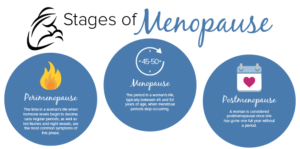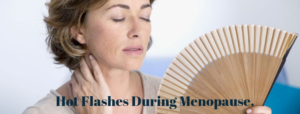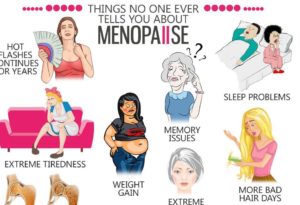Between the hot blazes, weight gain, and night sweats, menopause can be a tough time for you. Menopause brings hormonal changes in your body which can give you mood swings. Understanding exactly whatÔÇÖs going on with your body is important. So, let us know about it:
What is Menopause?
┬áIt is the end of a woman’s menstrual cycle and fertility. It happens when:
- Your ovaries no longer make estrogen and progesterone. (two hormones needed for fertility).
- Your periods have stopped for 1 year.
It is the stage in womenÔÇÖs life cycle that occurs in the ÔÇÖ40s. It happens naturally but sometimes surgery, treatment of a disease, or an illness can also favor this.
Symptoms:
Though it is a natural process ,a woman who meets this phase of the cycle can show some physical symptoms, such as:
- Anxiety
- Irregular periods
- Vaginal dryness
- Hot flashes
- Chills
- Night Sweats
- Insomnia
- Mood changes
- Weight gain and slowed metabolism
- Thinning hair and dry skin
- Loss of breast fullness
- Emotional stress
- Lack of confidence
- Laziness
These Symptoms may vary from women to women. But the most common symptom is experiencing some irregularity in your periods before the end.
Stages:
 Menopause happen slowly over three stages:
Menopause happen slowly over three stages:
Stage 1-Perimenopause: This is the first stage where your cycles will become irregular, but they will not stop at a time. Mostly women hit this stage around age 47. During this stage, you might notice symptoms like hot flashes. But during this stage there can be chances of getting pregnant.
Stage 2- Menopause: At this stage, youÔÇÖll have your final menstrual period. When you miss your cycle for a year it can give signs towards menopause. Hot flashes, vaginal dryness, sleep problems, and other symptoms are common in this stage.
Stage 3- Postmenopause: This stage begins when you hit the year mark from your final period. Keep in mind that after more than 1 year of no menstrual periods due to menopause, vaginal bleeding isn’t normal, so consult your doctor if you observe any spotting.
Things to know:
 Skipping periods during perimenopause is common and expected. Often, menstrual periods will skip a month and return, or skip several months and then start monthly cycles again for a few months. Periods also tend to happen on shorter cycles, so they are closer together. Despite irregular periods, pregnancy is possible. If you’ve skipped a period but aren’t sure you’ve started the menopausal transition, consider a pregnancy test
Skipping periods during perimenopause is common and expected. Often, menstrual periods will skip a month and return, or skip several months and then start monthly cycles again for a few months. Periods also tend to happen on shorter cycles, so they are closer together. Despite irregular periods, pregnancy is possible. If you’ve skipped a period but aren’t sure you’ve started the menopausal transition, consider a pregnancy test
Causes:
However, Menopause occurs naturally but there are certain factors which can contribute to it. Scroll down to know about it:
- Natural decline of reproductive hormones: With age your ovaries start making less estrogen and progesterone, the hormones that regulate menstruation ÔÇöresulting in infertility. In your 40s, your menstrual periods may become longer or shorter, heavier or lighter, and more or less frequent, until eventually ÔÇö on average, by age 51 ÔÇö your ovaries stop producing eggs, and you have no more periods.
- Hysterectomy: A hysterectomy is a removing uterus but not your ovaries, it usually doesn’t cause immediate menopause. Although you no longer have periods, your ovaries still release eggs and produce estrogen and progesterone. But surgery that removes both your uterus and your ovaries (total hysterectomy and bilateral oophorectomy) does cause immediate menopause.
- Chemotherapy and radiation therapy: Menopause can occur in cancer patients who are on chemotherapy. They can face symptoms of menopause in early age.
- Primary ovarian insufficiency: About 1 per cent of women experiences menopause before age 40 which may be due to primary ovarian insufficiency (where your ovaries fail to produce normal levels of reproductive hormones). For these women, hormone therapy is typically suggested until they have the natural age of menopause.
Facts related to Menopause:
- Menopause marks the end of a woman’s fertility.
- A reduction in estrogen levels can lead to the symptoms of menopause.
- There are a number of medical treatments and home remedies that can help with symptoms, including hormone replacement therapy (HRT) and self-management techniques.
- The average age of menopause is 51 years.
Complications:
 This natural process in women can lead to the development of complications, including:
This natural process in women can lead to the development of complications, including:
- Cardiovascular disease: A drop in estrogen levels has been associated with an increased risk of cardiovascular disease.
- Osteoporosis: Menopause results in Low bone density, leading to a higher risk of developing osteoporosis.
- Urinary incontinence: Menopause causes the tissues of the vagina and urethra to lose their elasticity. This can result in frequent and sudden urges to urinate resulting in involuntary loss of urine.
- Breast cancer: Women face a higher risk of breast cancer following menopause. Regular exercise can significantly reduce the risk.
Homemade Remedies for Hot Flashes:

Have hot flashes left you in a permanently sweaty state? DonÔÇÖt worry as youÔÇÖve got many remedies right in your own home.
Test out a couple of these at-home tips for countering menopause symptoms, including night sweats, and you may be feeling cooler before you know it.
- Switch to Soy-rich foods:
Isoflavones are compounds made up of polyphenols and they have some estrogen-like activity. Soybeans are one of the richest known sources of isoflavones.It is advisable to consume foods rich in soy such as tofu, roasted soy nuts or soya milk can help to reduce the severity of menopause symptoms.
- Evening primrose oil:
Besides its aesthetic value evening, primrose oil contains an essential fatty acid called gamma linolenic acid which is required for the synthesis of prostaglandins in the body. Prostaglandins play a role in regulating hormonal balance during the menopause.
- Saffron:
Kashmiri Saffron is used as a colouring agent and spice in cooking. Ayurveda also recommends it as a remedy for menopause; it also has an anti-depressant action that can help menopausal women keep their mood stable. Studies have found that saffron tends to hinder the depletion of serotonin ÔÇô a neurochemical that plays a major role in mood stabilization. Consuming saffron can, therefore, help to avoid mood swings that are a common problem in menopause. Steep a few saffron strands in a little warm milk for about 20 minutes and then drink the milk or you can have Kashmiri Saffron Kehwa that will surely stabilize your mood during menopause.
- Exercise:
 Engaging in regular physical activity helps improve your overall health, which may help hot flashes feel less intense. You can go for morning walks that will help in maintaining body weight and hormonal activity.
- Try dietary changes:
Eating a varied diet with plenty of whole grains, fruits, and vegetables promotes a healthy weight, which can lead to a decrease in hot flashes. Preventing consumption of spicy foods may also decrease hot flashes. Along with this, try to have a good amount of liquid in your diet.
If you are facing complications during menopause, donÔÇÖt be shy speak to your doctor. Moreover, if symptoms are making you uncomfortable, try some of these ideas at home. They may just work for you.
 

